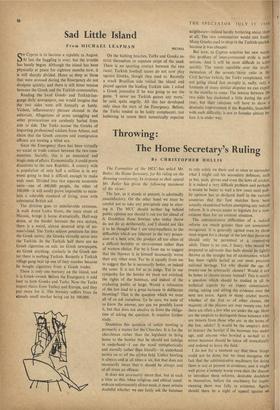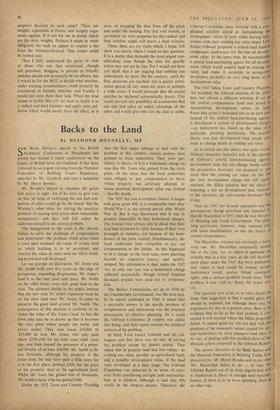Throwing:
The Home Secretary's Ruling By CHRISTOPHER HOLLIS The Committee of the MCC has asked Mr. Butler, the Home Secretary, for his ruling on the throwing controversy. In response to their appeal Mr. Butler has given the following statement of his views : The law, as it stands at present, is admittedly unsatisfactory. On the other hand we must be careful not to take any precipitate step in alter- ing it. The MCC should neither lag behind public opinion nor should it run too far ahead of it. Doubtless those bowlers who today throw do not do so deliberately, and I should not like it to be thought that I am unsympathetic to the difficulties which are inherent in the very posses- sion of a bent arm, the product all too often of a difficult heredity or environment rather than of wanton choice. Far be it from me to suggest that the thrower is in himself necessarily worse than any other man. Far be it equally from me to suggest that he is necessarily better, or indeed the same. It is not for us to judge. Yet in our sympathy for the bowler we must not overlook the rights of the batsman, and indeed of the cricketing public at large. Would a relaxation of the law lead to a great increase in deliberate throwing? That is the question which we must all of us ask ourselves. To be sure, we none of us know the answer, nor can we possibly know it, but that does not absolve us from the obliga- tion of asking the question. It requires further study.
Doubtless this question of unfair bowling is primarily a matter for the Churches. It is for the churchman rather than the legislator to bring home to the bowler that he should not indulge in underhand—I use the word metaphorically and morally rather than literally—in underhand tactics on or off the cricket field. Unfair bowling is always and at all times a sin, but that does not necessarily mean that it should be always and at all times an offence.
It does not necessarily mean that, but at such a time as this, when religious and ethical stand- ards are unfortunately all too weak, it must remain doubtful whether we can fairly ask the batsman to rely solely on them and at once to surrend what I might call his secondary defences, su( as bat, pads, gloves and even the laws of crick( It is indeed a very difficult problem and perhai it would be better to wait a few years until pu lie opinion has so declared itself in the vario countries that the Test matches have be actually abandoned before attempting any radii: reform. It is always easier to legislate for a no existent than for an existent situation.
The administrative difficulties of a radio reform are much greater than are sometim recognised. It is generally agreed even by tho most urgent for a change of the law that throw ii should only be permitted at a consentil adult. There is no one, I fancy, who would I prepared to advocate that balls should be light thrown at the straight bat of adolescence, whil has been rightly hailed as our most precio national heritage. Yet why should the age twenty-one be arbitrarily chosen? Would it n be better to choose twenty instead? This is sure a question which should be studied in all technical aspects by an expert commissic sitting, taking and sifting the evidence over t next ten years. Again in many cricket tear whether of the first or of other classes, I majority of the players are over twenty-one, h there are often a few who are under the age. 14( are the umpires to distinguish those batsmen «1 are minors from those who are, in the terms the law, adults? It would be the umpire's du to instruct the bowler if the batsman was und age, and anyone who bowled a no-ball to minor batsman should be taken off immediatt and ordered to leave the field. I do not for a moment say that these thin could not be done, but we must recognise t fact that the administrative machinery for dui them is not at present in existence, and it mit well prove a remedy worse even than the disetl to introduce these reforms, desirable doubt)4 in themselves, before the machinery for imp menting them was fully in existence. Aga should there be a right of appeal against er :11 :t. ps b- us en al 0- al es se
be .15T ch us of of .ly its ■ n,
he he
Lit nv
of ity der a ,ly 1gs he pig ;ht Ise :ss le- in, an umpire's decision in such cases? There are weighty arguments in favour and weighty argu- ments against. It is not for me to decide which are the more weighty. Perhaps it might be made obligatory for such an appeal to require a fiat from the Attorney-General. That matter could be looked into.
Then I fully understand the point of view of those who say that occasional, though not persistent, dragging in private or friendly matches should not necessarily be an offence, but it would be for the MCC to decide what matches, under existing circumstances, could properly be considered as friendly matches, and frankly I would not envy them their task. When the time comes to tackle this evil, we want to tackle it in a radical and final manner—not apply some pal- liative which would merely have the effect, as it were, of sweeping the dust from off the pitch and under the matting. For that very reason, to act before we were prepared for this radical and final solution might well prove a fatal mistake.
These, then, are my views which, I hope, will show you clearly where I stand on this question. It is a matter that demands the most urgent con- sideration, even though the time for specific action may not yet be ripe. Yet I would not have you think that I am arguing that nothing can immediately be done. On the contrary, until the final decisions are reached—for a purely provi- sional period of, say, some ten years or perhaps a trifle more—I would advocate that all cricket matches be declared automatically drawn. This would prevent any possibility of accusations that one side had taken an unfair advantage of the other and would give time for the dust to settle.







































 Previous page
Previous page